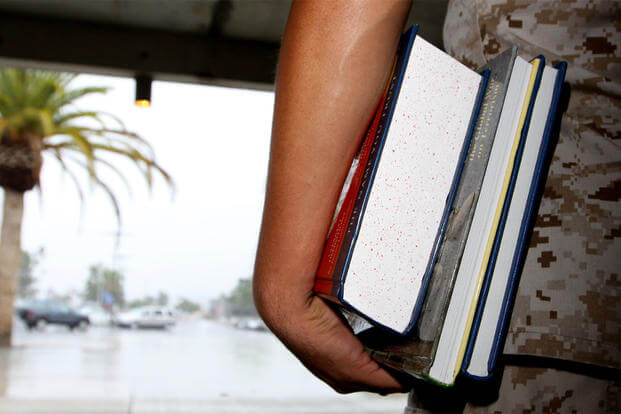The Army is looking at proposals to expand tuition assistance for active duty, Reserve and National Guard soldiers, particularly in the areas of licensing and credentialing not leading to academic degrees, the service's top enlisted soldiers said Monday.
"What we're trying to figure out -- what is that going to do to the cost and can we afford it," said Sgt. Maj. of the Army Dan Dailey. He said the service spends about $250 million annually on tuition assistance, while the military as a whole spends about $500 million.
Dailey said the Army is also looking at expanding tuition assistance for graduate school, but the details have yet to be worked out.
"We don't think there's going to be a significant cost," he said in a panel discussion with Command Sgt. Maj. Christopher Kepner of the Army National Guard and Command Sgt. Maj. James Wills of the U.S. Army Reserve at the annual meeting of the Association of the United States Army.
"A few years ago, we had to put limitations on the use of tuition assistance" despite the popularity of the program," Dailey noted, following the 2013 temporary suspension of new enrollments during the government shutdown that resulted from sequestration budget caps.
Currently, tuition assistance is available to eligible members of the Army, Navy, Marines, Air Force and Coast Guard. Eligibility varies by service, but Congress has given each the ability to pay up to 100 percent of tuition costs.
More than 201,000 soldiers across the active and reserve components now receive tuition assistance.
"It's a big topic for all our soldiers," Dailey said of tuition assistance and use of GI Bill benefits to advance education after leaving the service.
Education benefits are "the number one benefit and the reason why soldiers join the military ranks," and also why they stay, he said. "So it's critical, critical for success."
One of the "great initiatives" he's supporting would allow the use of tuition assistance not just for academics, "but also for credentialing and licensing" in trades such as auto mechanics and plumbing for those transitioning to civilian life, Dailey said.
"My belief is that the preponderance of our enlisted soldiers will probably work in technical trades" rather than in academic fields, he said. "Maybe we should be putting more money into technical trades and licensing in technical fields" although the requirements vary from state to state and even from county to county.
Dailey made similar remarks last month at a meeting of the Military Family Readiness Council, which later made recommendations to Defense Secretary Ashton Carter to expand tuition assistance for technical training and tuition assistance for military spouses.
The Military Spouse Career Advancement Account program is separate from service members' tuition assistance programs and available to spouses of lower-ranking troops. It helps pay for spouses' costs associated with pursuing licenses, certificates, certifications or associate degrees, but spouses of more senior troops have complained over the years that they're not eligible.
-- Richard Sisk can be reached at Richard.Sisk@Military.com.





























